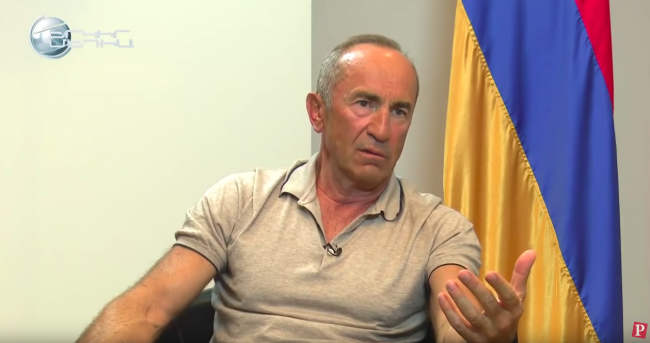

 Armenia’s former president Robert Kocharyan was charged on Thursday over the dispersal in 2008 of anti-government protests that left 10 people dead. The Special Investigative Service (SIS) filed a court motion for his pretrial detention immediately after questioning him as a witness. Kocharyan appeared in court on Friday morning.
Armenia’s former president Robert Kocharyan was charged on Thursday over the dispersal in 2008 of anti-government protests that left 10 people dead. The Special Investigative Service (SIS) filed a court motion for his pretrial detention immediately after questioning him as a witness. Kocharyan appeared in court on Friday morning.
Protests erupted in February 2008 after an ally of then president Kocharyan, Serzh Sargsyan, was declared the winner in contested presidential elections. The opposition led by Levon Ter-Petrosyan insisted the election results were rigged. In 10 days of protests peaking in the 1 March crackdown, eight civilians and two police officers were killed, and more than 200 people injured.
On 3 July, the SIS argued that Kocharyan involved the army into the political standoff establishing ‘de facto martial law’, which they said breached articles of the Armenian Constitution stipulating the military’s political neutrality. This, according to investigators, resulted in the ‘overthrow of the constitutional order’ from 23 February–2 March 2008. Specifically, Kocharyan was charged with violating Article 300 of the Criminal Code ‘for breaching the constitutional order’, which is punishable by 10–15 years in prison.
Court proceedings began late on Thursday evening but were postponed until Friday after Kocharyan failed to appear. His lawyers said he had not been served with the summoning in time, according to Caucasian Knot.
Before being questioned on Thursday, SIS head Sasun Khachatryan told the media that Kocharyan’s interrogation would be videotaped upon his request, but would not be made public. Kocharyan was accompanied by Yuri Khachaturov, who was Deputy Defence Minister during the 2008 events, as another witness.
After three hours of questioning, Kocharyan left the SIS building through a back door avoiding the press. Later that day, in an interview with TV station Yerkir, the former president called the charges against him ‘political persecution’ and a ‘vendetta’ aiming to ‘isolate’ him from upcoming snap parliamentary elections, Azatutyun reports. He said the prosecution was ‘a dangerous moment for the country’ and ‘a bomb under the foundation of statehood’. ‘I can imagine the jubilation that will break in Azerbaijan. Go on, give them a present like this!’, News.am quoted Kocharyan as saying.
Kocharyan told Yerkir he stopped answering questions after the authorities told him that his status had changed from a witness to a suspect. Kocharyan said he expected to be imprisoned, but was ‘ready to fight till the end’.
In the interview, Kocharyan sought to justify the 20-day state of emergency and the mobilisation of the army, by talking of the first police officer to be killed. He said he dispatched the armed forces as a strategic security response to the opposition, who he said intended to ‘violently overthrow’ the government. He added that he didn’t know whether the army was actually used to disperse the crowds.
Kocharyan praised Serzh Sargsyan as a leader but downplayed his connection to him, insisting that the link between them ‘was almost completely severed’ over recent years.
On 3 July, Armenian law enforcement agencies charged former Defense Minister Mikayel Harutyunyan with ‘illegally ordering’ the armed forces to suppress demonstrations on 23 February 2008.
Velvet Revolution
Prime Minister Nikol Pashinyan, who was an active supporter of Ter-Petrosyan, was imprisoned in 2010 accused of being one of the organisers of the ‘violent’ 2008 rallies. Pashinyan, who was editor-in-chief of Armenian daily Haykakan Zhamanak at the time of the protests, was sentenced to seven years in prison but released in 2011 under an amnesty.
A month before ousting Serzh Sargsyan in April in Armenia’s ‘Velvet Revolution’, Pashinyan demanded Kocharyan be questioned over allegations demonstrators shot at security forces, a justification Kocharyan used for deploying the army against them. In 2008, the authorities also insisted that some demonstrators set fire to police vehicles and buses. The General Prosecutor’s Office refused to summon Kocharyan. On 12 June, Pashinyan publicly called on the SIS to ‘finally’ investigate the killings.
[Read on OC Media: Fiery revolutionary or pragmatic politician: what to expect from Nikol Pashinyan]
Robert Kocharyan served as Armenia’s second president, from 1998–2008. He was also the first president of Nagorno-Karabakh, from 1994–1997, and was previously a prominent leader of Nagorno-Karabakh’s independence movement.









